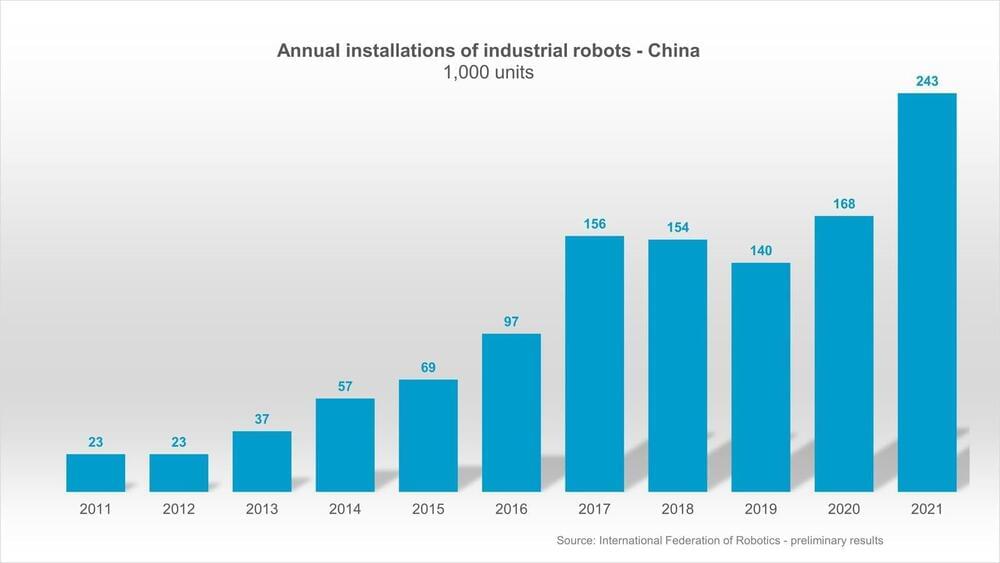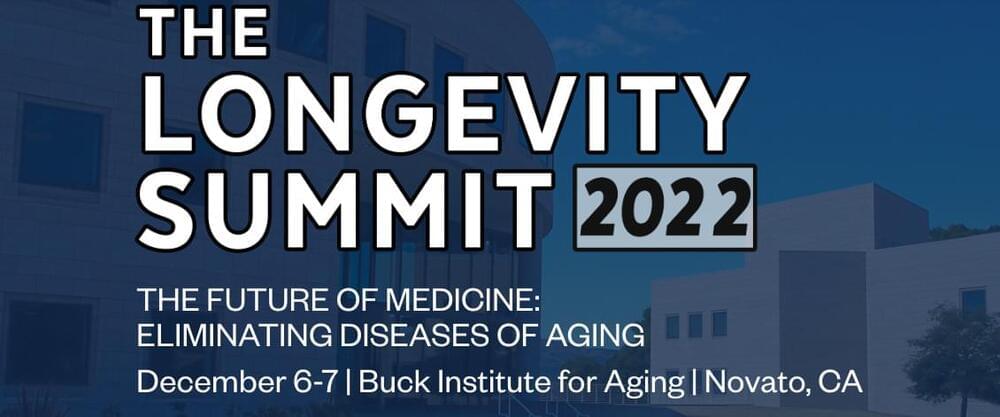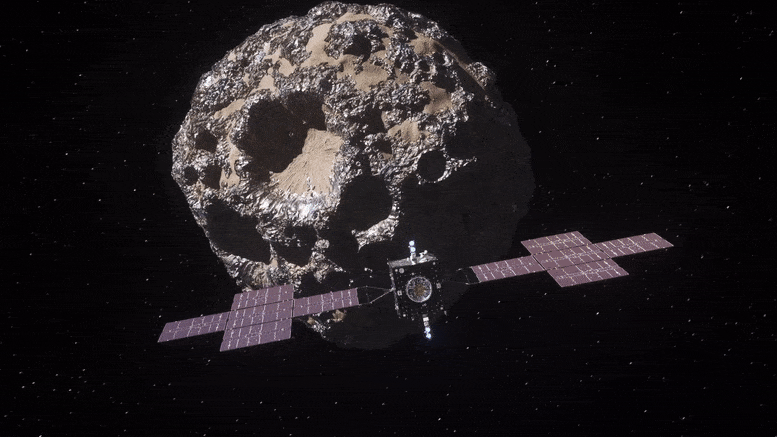Coca leaf and cocaine may soon join alcohol, tobacco, caffeine and cannabis as legally regulated drugs.
Colombia’s new government wants to legalize coca leaf and cocaine. So does Peru. And Bolivia has been on that path since 2012.


“China was leading the global recovery after the Covid-19 pandemic and accounted for half of worldwide robot installations in 2021,” said Marina Bill, President of the International Federation of Robotics. “Growth is strong across all industries with electrical and electronics being the dominant sector – up 30% to 81,600 installations. The automotive industry also showed a strong recovery. This was mainly driven by electric vehicle manufacturing in China. It rose by 89% in 2021 with 50,700 installations.”
Chinese government supports robotic automation
In China aging population’s demographics causes shortage of labor and drives the growth of robotic automation. The continued robotization of industries has been announced earlier this year by the government. The Five-Year plan for the robotics industry, released by the Ministry of Industry and Information Technology (MIIT) in Beijing, focuses on promoting innovation — making China a global leader of robot technology and industrial advancement.

On December 6–7, 2022, the Buck Institute for Research on Aging will be hosting the Longevity Summit 2022. Lifespan.io is pleased to announce that we are an official media partner for this upcoming conference.
The Summit will see many of the leading experts in the field coming together in the grounds of the architecturally distinct Buck Institute. It is being framed as a peer-to-peer learning experience aiming to unite longevity entrepreneurs, pharma and biotech companies, investors, researchers, and government organizations.
Here’s what the organizers had to say about the event:

The project, known as DAF-MIT AI Accelerator, selected a pilot out of over 1,400 applicants.
The United States Air Force (DAF) and Massachusetts Institute of Technology (MIT) commissioned their lead AI pilot — a training program that uses artificial intelligence — in October 2022. The project utilizes the expertise at MIT and the Department of Air Force to research the potential of applying AI algorithms to advance the DAF and security.
The military department and the university created an artificial intelligence project called the Department of the Air Force-Massachusetts Institute of Technology Artificial Intelligence Accelerator (DAF-MIT AI Accelerator).
Full Story:
The project and the pilot
A prototype of the project was signed with an executive order in 2019, and it had various strategies put into place in 2020. The collective team, known as the DAF-MIT AI Accelerator, commissioned their lead AI pilot last month. “In this pilot, [the cohort] will gain a practical grounding in AI and its business applications helping you transform your organizations into the workforce of the future,” said Major John Radovan, deputy director of the AIA.

The mission team continues to complete testing of the spacecraft’s flight software in preparation for the 2023 launch date.
On Friday, October 29, NASA
Established in 1958, the National Aeronautics and Space Administration (NASA) is an independent agency of the United States Federal Government that succeeded the National Advisory Committee for Aeronautics (NACA). It is responsible for the civilian space program, as well as aeronautics and aerospace research. Its vision is “To discover and expand knowledge for the benefit of humanity.” Its core values are “safety, integrity, teamwork, excellence, and inclusion.”

“We are very pleased that we can now start with the first activities to stimulate and consolidate cellular agriculture in the Netherlands,” said Ira van Eelen, CEO of KindEart. Tech and a board member of Cellular Agriculture Netherlands. “With this we can guarantee that the Netherlands remains the ideal place for cellular agriculture to thrive. We have a rich history in cellular agriculture and are a global leader in biotechnology, alternative proteins and food innovation. Supported by this visionary leadership that the Dutch government is showing again today, we will expand our team in the coming months and roll out the first activities around public research, scaling up, and education.”
Indeed, the Netherlands has been demonstrating considerable progress in developing cultured meat. In July, for example, Dutch company Meatable revealed its first lab-grown sausages, which are expected to go on sale to consumers by 2025. The addition of €60 million in government funding will make the Netherlands an even more attractive location for companies in the sector.
Currently a niche and miniscule part of the overall food market, cultured meat has potential to become another “exponential” technology – much like the semiconductor industry, solar energy, genome sequencing, and so on. The benefits in terms of animal welfare, climate change, food safety, antibiotic resistance, land and water usage could be substantial.

Concern is rising over the ongoing Ebola outbreak in Uganda that is now swiftly spreading in the densely populated capital city of Kampala. The outbreak is caused by a lesser-seen species of Ebolavirus, the Sudan virus, for which there is no proven vaccine or treatment.
Uganda’s Ministry of Health declared an outbreak on September 20, a day after a 24-year-old man from a rural area in central Uganda died of the disease. Since then, the virus has spread to seven districts in the country, with the ministry reporting a total of 109 confirmed cases and 30 deaths. Health workers accounted for 15 of the confirmed cases and six of the confirmed deaths. There are also unofficial reports of probable cases and deaths.
Health experts are particularly concerned about the spread into Kampala, which government officials reported only Sunday. As of Wednesday, the city of more than 1.6 million has seen at least 15 confirmed cases. Of the 15 cases, six are school-age children from the same family.

Meanwhile, in Kenya, Facebook to start sharing advertising data with Kenya’a tax agency, and the police.
In the terms, the company said businesses placing adverts across its different platforms would have given it consent to share information with government agencies looking for such information to assist in lawful investigations.
“Our licence to deliver your ad will end when we have completed your order. You understand, however, that…you consent that Meta may disclose your advertising content, and all information associated with your advertising, to a governmental entity or body if Meta believes that disclosure would assist in a lawful investigation,” says the company in the terms that will be effective January 3, 2023.
It added that companies placing adverts would be required to disclose information such as the nature of the business they are involved in and the kind of people targeted by such adverts.
The Chinese government has been accused of establishing at least two undeclared “police stations” in the Netherlands.
Dutch media found evidence that the “overseas service stations”, which promise to provide diplomatic services, are being used to try to silence Chinese dissidents in Europe.
A spokeswoman for the Dutch foreign ministry said the existence of the unofficial police outposts was illegal.
The Chinese foreign ministry has rejected the Dutch allegations.
Please subscribe HERE http://bit.ly/1rbfUog.
#China #Netherlands #BBCNews

Research at Boston University that involved testing a lab-made hybrid version of the SARS-CoV-2 virus is garnering heated headlines alleging the scientists involved could have unleashed a new pathogen.
There is no evidence the work, performed under biosecurity level 3 precautions in BU’s National Emerging Infectious Diseases Laboratories, was conducted improperly or unsafely. In fact, it was approved by an internal biosafety review committee and Boston’s Public Health Commission, the university said Monday night.
But it has become apparent that the research team did not clear the work with the National Institute of Allergy and Infectious Diseases, which was one of the funders of the project. The agency indicated it is going to be looking for some answers as to why it first learned of the work through media reports.